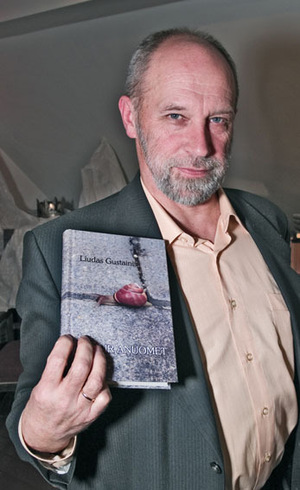FALL OF GREAT ILLUSIONS 0
(Novel by Liudas Gustainis “Like Then”) Mindaugas Grigaitis
www.kamane.lt, 2007 05 02
Liudas Gustainis with his new book "Like Then". Photo by Alvydas Urbanas.
In brief: Our writers worry that serious literature is read less and less. The worry is grounded of course, but the strange thing is that the ones who express it are the creators of the serious literature. The situation of literature critics is also problematic – constant talks about its crisis and the commercial interest of critics often makes writers ignore the critics targeted at them and criticize the society instead that it is not capable of reading complicated texts any more.
Presenting his new novel “Like Then”, the writer Liudas Gustainis described it as a “novel complicated to read”; however, it appeared that it is possible to read the book quickly. Still, it is harder to state without thinking that it was easy.
The epigraph and annotation creates the impression that the analysis of deep philosophical insights will be needed: “What is history? Is it the objective story about real events <...>, or is the history that boils inside our souls more important as all events – former, present and future – are taking place at the same time here, and the last stop of the train is freedom from any events at all”. It becomes clear while reading the book that the novel slides easily on the surfaces of different historical realities and philosophical thoughts.
In the novel, heroes of different epochs and cultures meet in one time and space with characters imaged by the author, they find themselves in historically real and fictional situations. Prophet Moses, Egyptian pharaoh Akhenaten and his wife Nephertite communicate with the bishop of Vilnius Ignotas Jokūbas Masalskis or knights Radvilas. Characters reincarnate in each other constantly and travel from one epoch to another. Akhenaten turns into a TV show director, Moses – a plumber, Nephertite – wind, women - into cows, men - into hens and turkeys.
The adventure of reading is strong and interesting in the first part of the book - the novel encourages to rethink history and to open up its image at the present time. Meanwhile, the intrigue of the story fades in the second part of the book “Like Then” as the illustrative picturing of history is used more frequently. Moreover, it is important for a man of letters to find a language that enables to feel the epoch, dates and historical figures are not sufficient. Every epoch has its feeling, spiritual status, language manner, and they seem to have been ignored by the author. As a result, ungrounded cultural parallels and hardly motivated connections of epochs as well as identifications characters makes one put a diagnosis – the author found it more important to prove the ideas he expressed in the epigraph rather than tell the story.
Some Lithuanian prose writers are still writing Great Books the purpose of which is to explain to the reader about the world and existence. However, the reader knows that the writer is also a lost and lonely searcher for the great answers and therefore does not require those answers from him/her. We are searching for them in life, and the language should be used in literature that would portray our reality and turn the daily life into an unusual story. Has L.Gustainis found such language in the novel “Like Then”? The author of the article states to doubt it.

